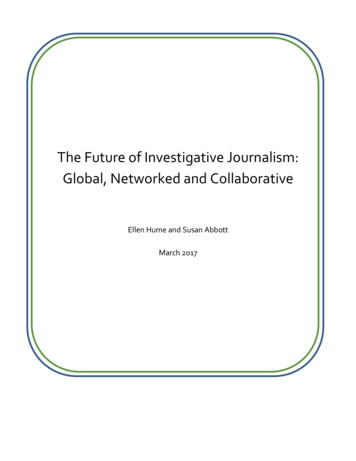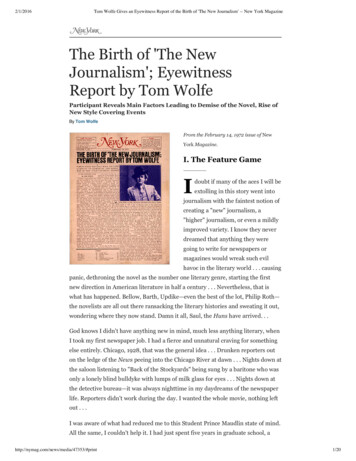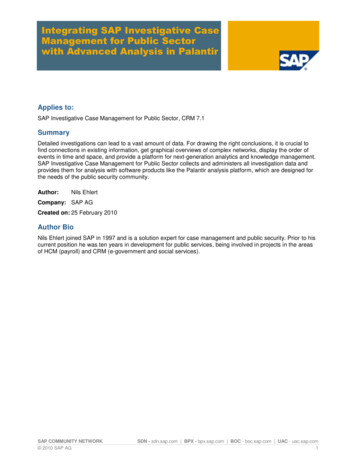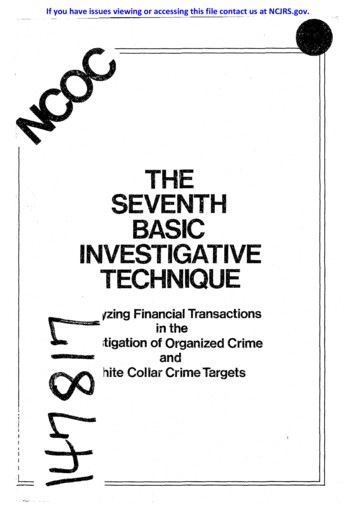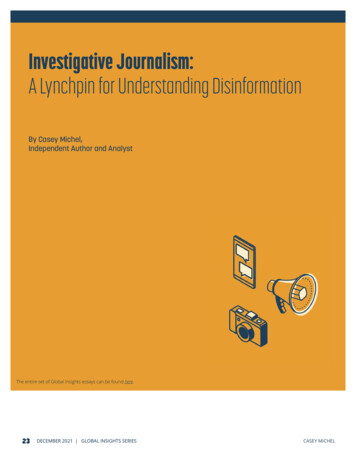
Transcription
Investigative Journalism:A Lynchpin for Understanding DisinformationBy Casey Michel,Independent Author and AnalystThe entire set of Global Insights essays can be found here.23DECEMBER 2021 GLOBAL INSIGHTS SERIESCASEY MICHEL
Investigative Journalism: A Lynchpin for Understanding DisinformationInvestigative journalism is a key tool in the fight against disinformationand influence operations. Investigative journalists are one of democracies’competitive advantages against authoritarian and illiberal governments,serving as the “white blood cells” within the democratic body politic thathunt disinformation networks and counter their negative impact. Whilea free press alone is not enough to stop the spread of disinformation,investigative journalists’ ability to recognize and publicly identifydisinformation networks is vital to disrupting influence operations.To best address a complex challenge, it is first necessary to understand it. With the rapidexplosion of disinformation that has adversely impacted societies globally, investigativejournalism has proven vital in revealing the nature and extent of disinformation operations.It also has identified the actors responsible for these efforts and those who stand to gainfrom such activity. With a firmer grasp of modern disinformation campaigns, investigativejournalism can also help provide governmental and civil society actors with the necessarytools to counter disinformation operations successfully.Investigativejournalismputs criticalinformation aboutdisinformation intothe public domainthat can be usedand interpretedacross borders.24The tools investigative journalists use to report on other criminal investigations are equallycrucial in the fight against disinformation. First, the skill with which they conduct basic investigative work is central to uncovering information operations and networks. Second, theirexpertise in fielding tips and interviewing key actors grants them invaluable insight into theinner workings of these information networks. Finally, investigative journalists’ healthy skepticism regarding subject material is integral to their efforts as it drives them to find original orcorroborative evidence about any networks they examine or uncover.In recent years, investigative journalists have harnessed these skills and exposed disinformation networks1 around the world. From details of Russia’s social media influence operations,2 to China’s so-called “50 Cent Army,”3 to campaigns launched by both state-linked andnon-state actors, we now have a greater understanding of the breadth of disinformationcampaigns—and their intersection with a swelling number of social media platforms—thanat any point prior.Investigative journalism puts critical information about disinformation into the public domainthat can be used and interpreted across borders. For example, investigations into Russia’sdisinformation campaigns in the wake of a contentious U.S. presidential campaign in 2016revealed the extent of Moscow’s disinformation operations in the U.S., Russia, and elsewhere. One primary prong of the Kremlin’s disinformation campaign centered on falseFacebook, Twitter, and Instagram accounts. While authorities at Facebook and Twitter ledefforts to remove a number of accounts in September 2017, they only did so following journalistic investigations4 into these Kremlin-linked disinformation efforts. From tracking downthe troll operators to those duped by fake accounts—including Americans (or others) whoDECEMBER 2021 GLOBAL INSIGHTSCASEY MICHEL
Investigative Journalism: A Lynchpin for Understanding Disinformationabetted Russian disinformation operations—investigative journalists unearthed much ofwhat is now known about these networks’ operations, as well as their broader context andtheir success.Investigativejournalism doesnot merely identifyfake social mediaaccounts andtheir impact.Investigativejournalists exposethese complexdisinformationactivities in anentirely different,sometimes moreevocative orpersonal manner.25American journalists were hardly alone in pursuing these investigative efforts. For instance,in the Philippines, the online outlet Rappler has consistently broken stories5 regardingdisinformation campaigns linked to President Rodrigo Duterte’s administration, includingidentifying coordinated social media campaigns that attacked the independent Filipinopress. Collaborations among multiple outlets in numerous countries have also uneartheddisinformation campaigns. Indeed, a 2020 joint investigation from Russia’s The Insider andBellingcat, discovered6 that Russian authorities organized disinformation campaigns relatingto the downing of a passenger plane over Ukraine.Investigative journalism does not merely identify fake social media accounts and theirimpact. Big data-based mapping projects do an incredible job tracking and analyzing thesenetworks, especially on social media platforms.7 However, investigative journalists exposethese complex disinformation activities in an entirely different, sometimes more evocativeor personal manner. Shortly after Russia’s social media disinformation campaigns werediscovered (and in many cases thwarted successfully), investigations probed deeper intothese campaigns and uncovered another strand of Kremlin-linked disinformation efforts.According to CNN reports,8 a new series of highly popular news outlets targeting Americanyoung adults maintained direct links to Moscow. Though nominally independent, journalistsdiscovered that these outlets were overseen by a company called Maffick Media, whosemajority stakeholder is a subsidiary of the Kremlin-controlled RT. These outlets promoteddivisive, slanted, or malign material regularly, similar to other traditional disinformationchannels. They also managed to gain millions of followers on social media accounts,magnitudes more than previous Kremlin-backed disinformation operations had accrued.In response to these findings, social media companies like Facebook and Twitter beganexploring ways to force these outlets to reveal their governmental ties for each platform’suser base. However, shortly thereafter, investigative journalists dissected Maffick Media’snetwork further and found that it had attempted to work around disclosure requirementsby re-registering as a Delaware (USA) LLC. This action didn’t require any information aboutthe company’s actual owners and allowed Maffick’s accounts to dodge9 new counterdisinformation transparency requirements. Social media companies appeared unawarethat Maffick employed such a tactic. According to the head of Facebook’s security policy,neither the RT subsidiary nor any of the related accounts informed the social media firmthat they were changing ownership structure, allowing Maffick to work around Facebook’snarrow disclosure requirements. It was only when journalists exposed the company’s newownership structures and alerted social media platforms of Maffick’s actions that Facebookand Twitter began formulating new, more stringent disclosure policies that labelled theoutlets as “state-controlled media.”10 While labeling is hardly a panacea,11 it is nonetheless astep toward the kind of transparency required to combat this threat. Furthermore, simplymapping these disinformation networks online—without understanding the financial andmulti-level backing of those networks—might not have had the same impact and responseby outlets.DECEMBER 2021 GLOBAL INSIGHTSCASEY MICHEL
Investigative Journalism: A Lynchpin for Understanding DisinformationThese examples evince the vital roles investigative journalists play in discovering thesedisinformation networks.12 These investigations have outed supposed “grassroots” media,13identified those behind nominally independent outlets,14 uncovered disinformationefforts on secondary social media platforms like Tumblr15 or Medium,16 and tracked paiddisinformation influencers to hidden pockets around the world.17 These efforts have notslowed. Recently, BBC reporters18 uncovered new China-linked campaigns to circumventdisclosure requirements on YouTube, pressuring YouTube influencers nominallyindependent from the CCP to whitewash Beijing’s crimes. It is suspected that these“vloggers” are remunerated for their work; however, they deny these charges. Moreover,investigative journalists at OpenSecrets analyzed how “dark money” networks continue toback outlets pumping out disinformation19 for unwitting audiences.If disinformationcampaigns areaimed at thedemocratic bodypolitic, investigativejournalists areakin to white bloodcells, hunting andidentifying maligndisinformationcampaigns thatthreaten the healthof the democraticpolity.These recent investigations underscore journalism’s place at the tip of the counter-disinformation spear. To use another metaphor, if disinformation campaigns are aimed at thedemocratic body politic, investigative journalists are akin to white blood cells, hunting andidentifying malign disinformation campaigns that threaten the health of the democratic polity. They are part of democracies’ competitive advantage over autocratic or illiberal governments elsewhere. There is no stronger defense against disinformation than transparency.However, a free and transparent press is not the only solution. The U.S., for instance, hasseen disinformation campaigns continue to spread despite the country’s free and fair press.Still, providing and protecting space for investigative journalists to uncover such networksremains vital to disrupting these campaigns.In addition, there have been new developments and strategies in recent years among investigative journalists—especially in terms of collaboration—that further cement its importancein countering disinformation. Transnational organizations like the Organized Crime andCorruption Reporting Project (OCCRP) and International Consortium of Investigative Journalists (ICIJ) allow investigative journalists to work with colleagues elsewhere far more easily,resulting in remarkable, unprecedented investigations. Indeed, more international, collaborative approaches are crucial to combatting novel disinformation operations. After all, thesedisinformation networks rarely confine themselves to a single jurisdiction.Investigative journalism is well positioned to uncover disinformation networks, and theirwork and tactics should be continued and emulated. However, investigative journalism stillhas limitations, from funding concerns to growing legal threats and physical intimidation—even within developed democracies. Yet even with these pressures, investigative journalistsare rarely cowed.20 Civil society and other actors should step into the breach to help in thisglobal effort in the following ways:CSOs and NGOs should consider strengthening independent funding for investigativejournalists. Journalists around the world face financial pressures; this support would helpeliminate some these concerns and allow journalists to focus on their work instead.Likewise, civil society should help continue to construct cross-border bridges. Thesetrans-national relationships have proven key to successful journalistic collaboration, andalready exist in civil society; there’s no reason they shouldn’t be expanded.26DECEMBER 2021 GLOBAL INSIGHTSCASEY MICHEL
Investigative Journalism: A Lynchpin for Understanding DisinformationFew investigative journalists exhibit thedoggedness and fearlessness of those inthe profession than Maria Ressa—seenhere on trial for Libel in the Philippines—asher recent Nobel Prize award illustrates.Finally, civil society should continue to highlight the importance of investigative journalism(especially as it pertains to untangling disinformation networks) wherever possible. Not onlywill doing so highlight a relationship that often goes overlooked, but it will help draw moreaudiences to these outlets along the way.Without continued support, investigative journalism will struggle to uncover disinformation,and our democracies will be the worse for it.KEY POINTS:- Investigative journalists counter disinformation efforts by exposing operationsand enabling deeper and more thorough investigations.- Transnational organizations of journalists support robust investigationsand cross-national collaboration, responding to the transnational nature ofdisinformation networks and operations.- Despite playing a vital role in revealing disinformation networks and holdingthose who operate these networks to public account, it is important for civilsociety organizations and other nongovernmental actors to strengthen crossborder and sectoral ties and support for investigative journalists.Casey Michel is a writer, analyst, and investigative journalist focused primarily onkleptocracy, offshoring, and illicit finance. He is the author of the book AmericanKleptocracy, on America’s transformation into the world’s greatest offshore haven.His analyses have appeared in Foreign Affairs, Foreign Policy, the Atlantic, Vox, theNew Republic, Politico, the Washington Post, the American Interest, Organized Crimeand Corruption Reporting Project, open Democracy, the Guardian, and many others.Follow him on Twitter @cjcmichel.27DECEMBER 2021 GLOBAL INSIGHTSCASEY MICHEL
Investigative Journalism: A Lynchpin for Understanding DisinformationEndnotes1Katy Steinmetz, “How Your Brain Tricks You Into Believing Fake News,” Time, August 9, risis/.2Meg Kelly and Elyse Samuels, “How Russia weaponized social media, got caught and escaped consequences,” Washington Post, December18, 2019, sequences/.3Joyce Lau, “Who Are the Chinese Trolls of the ’50 Cent Army’?,” VOA, October 7, 2016, trolls50-cent-army.4Luke Harding, “What we know about Russia’s interference in the US election,” Guardian, December 16, dential-election.5“Forum Q&A: Maria Ressa on Digital Disinformation and Philippine Democracy in the Balance,” National Endowment for Democracy,February 5, 2018, y-in-the-Balance.pdf.6“Investigative journalists link website behind fake news about MH17 crash to Russia’s GRU,” Meduza, December 12, out-mh17-crash-to-russia-s-gru.7There are a number of highly innovative and successful organization conducting groundbreaking quantitative-based network mapping.Graphika is one such organization, featured here: ive-companies-2021.8Donie O’Sullivan, Drew Griffin, Curt Devine, and Atika Shubert, “Russia is backing a viral video company aimed at American millennials,”CNN, February 18, 2019, videos/index.html.9Samuel Rebo, “Facebook, FARA and Foreign Media,” Lawfare, September 16, 2020, a.10 Casey Michel, “Russian-linked outlet fights Facebook transparency in U.S. courts,” eurasianet, August 27, fights-facebook-transparency-in-us-courts.11 Emma Green, “The Words the AP Didn’t Want to Use,” Atlantic, August 10, /.12 Josh A. Goldstein and Shelby Grossman, “How disinformation evolved in 2020,” Brookings Institution, January 4, on-evolved-in-2020/.13 Charles Davis, “‘Grassroots’ Media Startup Redfish Is Supported by the Kremlin,” Daily Beast, June 19, p-redfish-is-supported-by-the-kremlin.14 Casey Michel, “Exclusive: Website targeting black Americans appears to be elaborate Russian propaganda effort,” Think Progress,October 12, 2017, -site-90625b18f262/.15 Issie Lapowsky, “Tumblr Finally Breaks Its Silence on Russian Propaganda,” Wired, March 23, 2018, a/.16 Matt Burgess, “Yup, the Russian propagandists were blogging lies on Medium too,” Wired, December 10, 2017, log-longform-medium-posts.17 Clarissa Ward, Katie Polglase, Sebastian Shukla, Gianluca Mezzofiore, and Time Lister, “Russian election meddling is back – via Ghanaand Nigeria – and in your feeds,” CNN, April 11, 2020, rms-2020-ward/index.18 Kerry Allen and Sophie Williams, “The foreigners in China’s disinformation drive,” BBC, July 11, 2021, www.bbc.com/news/world-asia-china-57780023.19 EJ Dickson, “Why Isn’t Amazon Cracking Down on QAnon Merch?,” Rolling Stone, October 13, 2020, rime-qanon-merch-1074190/.20 Justin Spike, “Down But Not Out: Hungary’s Journalists React to Shrinking Freedoms,” VOA, September 25, 2020,www.voanews.com/a/press-freedom freedoms/6196374.html.Photo credit: Philippine Journalist Maria Ressa Face Libel Verdict,” Ezra Acayan/Getty Images.28DECEMBER 2021 GLOBAL INSIGHTSCASEY MICHEL
disinformation networks and operations. - Despite playing a vital role in revealing disinformation networks and holding those who operate these networks to public account, it is important for civil society organizations and other nongovernmental actors to strengthen cross-border and sectoral ties and support for investigative journalists.

